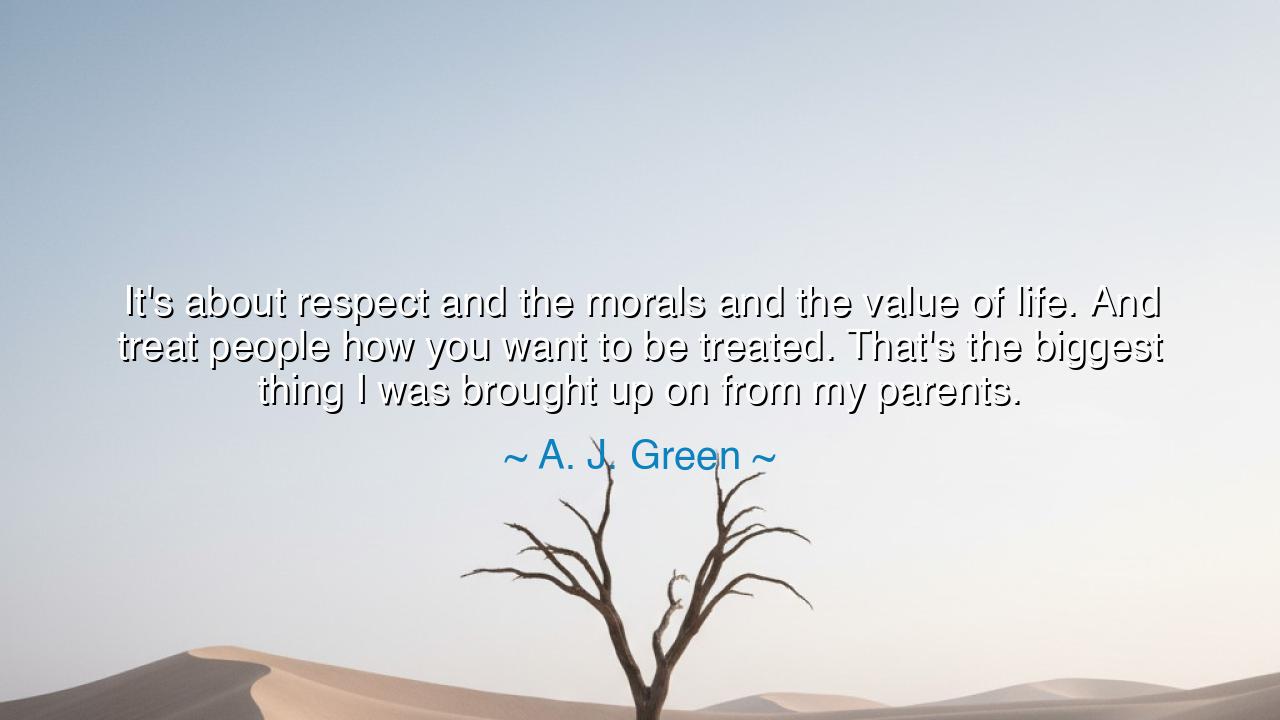
It's about respect and the morals and the value of life. And
It's about respect and the morals and the value of life. And treat people how you want to be treated. That's the biggest thing I was brought up on from my parents.






In the great cycle of life, there are fundamental truths that bind us together, truths that transcend time and place, offering us a guiding light in our journey through the world. A. J. Green, in his reflection, speaks of one such truth: "It's about respect and the morals and the value of life. And treat people how you want to be treated. That's the biggest thing I was brought up on from my parents." In these words, Green distills a timeless lesson, one that has been passed down through the ages—respect for others is the foundation upon which all virtue is built, and how we treat others shapes the world we live in.
In the ancient world, the value of respect was central to ethical philosophy. Confucius, the great Chinese philosopher, famously taught that the key to harmonious living was found in the practice of the Golden Rule—"Do not do to others what you do not want done to yourself." This principle, which echoes through the ages, is a reflection of the deep moral wisdom of the ancients, who understood that the fabric of society is woven through the relationships between individuals. By treating others with respect and compassion, we cultivate not only personal virtue but contribute to a more just and harmonious world.
Consider the story of Socrates, the philosopher who, despite his wisdom and influence, was often ridiculed and persecuted by those in power. Yet, he never wavered from his belief in treating others with respect and dignity, even those who opposed him. When accused of corrupting the youth of Athens, Socrates stood firm in his conviction that respect for others' opinions and the pursuit of truth were the foundations of a just society. His willingness to engage in dialogue with anyone—no matter their station or opinion—was a testament to his commitment to the moral values he espoused. Socrates’ life serves as a powerful reminder that respect and the value of life are not conditional, but universal principles that should guide all human interactions.
A. J. Green’s words resonate with this ancient understanding of the Golden Rule, highlighting the profound impact that respect and morality can have on our relationships and our lives. The simple act of treating others as we wish to be treated is not only a moral imperative but a practical guide to building mutual trust and understanding in any community. Green’s reflection on how he was raised by his parents underscores the importance of family and upbringing in shaping an individual’s sense of ethics. Just as parents have the power to instill values in their children, so too does society have the collective responsibility to nurture the moral compass of future generations.
The teachings of Jesus Christ, who also emphasized loving one’s neighbor as oneself, further reinforce the enduring wisdom of the Golden Rule. Jesus, despite facing persecution and hardship, treated all with love and compassion, from the lepers he healed to the outcasts he befriended. His life was a testament to the belief that respect for others is the highest form of virtue and that through respect and love, we fulfill our highest calling as human beings. In much the same way, A. J. Green reflects on the lesson his parents taught him, one that aligns with the deepest moral teachings of history—that how we treat others defines who we are as individuals and as a society.
In the modern world, A. J. Green’s words offer us a powerful reminder in an era that often values success and personal achievement over character and moral integrity. In a society that sometimes elevates the loudest voices and the most visible people, it is easy to forget the foundational values of respect, morality, and the value of life. Yet, as Green and the great figures of the past have shown us, it is through the small acts of respect—how we treat others—that we build the true measure of our lives. In the quiet moments, in the way we speak to others and offer kindness, we reflect the virtue that defines a good life.
The lesson we must take from Green’s words is both simple and profound: respect is the cornerstone of all good relationships, whether in the family, the community, or the world at large. Treat others as you wish to be treated, and in doing so, you cultivate a life of virtue, honor, and compassion. This principle is not merely an abstract idea but a practical guide to living in a way that builds the foundation for a just and harmonious society. Let us take A. J. Green's message to heart and make respect and morality the cornerstones of how we interact with those around us, knowing that in doing so, we create a better world for all.






AAdministratorAdministrator
Welcome, honored guests. Please leave a comment, we will respond soon